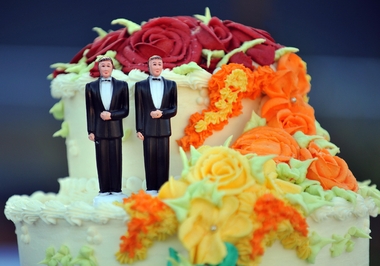Kennedy keeps eye toward legacy in same-sex wedding cake case

(CNN) -- Supreme Court Justice Anthony Kennedy tried to make clear on Monday that he was not retreating from his landmark 2015 decision allowing same-sex marriage nationwide, while he sided with a Colorado baker who refused to create a wedding cake for two gay men.
Slowly reading excerpts of his ruling from the court's bench, the bespectacled 81-year-old justice first emphasized the importance of protecting the rights and dignity of gay persons who want to marry.
"Gay couples cannot be treated as social outcasts," said Kennedy, who has been the author of every Supreme Court gay rights ruling since 1996, including the decisive 5-4 ruling in Obergefell v. Hodges three years ago, which opened the door to gay marriage across America.
But Kennedy, cautiously balancing two tenets, stressed that a second principle must also be respected: freedom of religion. In this situation, he said in the 7-2 decision, religion was not.
This was the first major gay-rights case to reach the court since 2015, and an overriding question was how Kennedy, a centrist conservative, would address the competing values. The importance of his voice in this area cannot be overstated. For more than two decades, Kennedy has provided key votes and penned the legal rationale for gay rights.
In recent years Kennedy has pondered retirement -- and there is currently no clear signal of his plans. Any assessment of his legacy would focus, in good measure, on his opinions highlighting the dignity of gay people. He appeared to take care to preserve that emphasis on Monday, even as he ruled against two gay men.
Kennedy said the Colorado Civil Rights Commission, which had sanctioned Christian baker Jack Phillips for discrimination, revealed "a clear and impermissible hostility toward the sincere religious beliefs that motivated his objection" to creating the cake for Charlie Craig and Dave Mullins.
Kennedy observed that a commissioner had disparaged Phillips by asserting that religion has been used to justify slavery and the Holocaust. The commissioner also described a person's faith as "one of the most despicable pieces of rhetoric that people can use" to hurt others.
"This sentiment is inappropriate for a Commission charged with the solemn responsibility of fair and neutral enforcement of Colorado's anti-discrimination law -- a law that protects discrimination on the basis of religion as well as sexual orientation."
Yet, even with abundant criticism for the commission, Kennedy said that any decision favoring Phillips "would have to be sufficiently constrained, lest all purveyors of goods and services who object to gay marriages for moral and religious reasons in effect be allowed to put up signs saying 'no goods or services will be sold if they will be used for gay marriages,' something that would impose a serious stigma on gay persons."
As he concluded his 18-page opinion, Kennedy warned against "subjecting gay persons to indignities when they seek goods and services in an open market."
In her dissenting opinion, Justice Ruth Bader Ginsburg, joined by Justice Sonia Sotomayor, echoed such sentiment and said she agreed with much of what Kennedy had written.
In the end, however, she said the delicate balance should have tipped to the side of Craig and Mullins.
"What matters," Ginsburg wrote, "is that Phillips would not provide a good or service to a same-sex couple that he would provide to a heterosexual couple."
The-CNN-Wire™ & © 2018 Cable News Network, Inc., a Time Warner Company. All rights reserved.
The Gayly. June 5, 2018. 9:45 a.m. CST.





